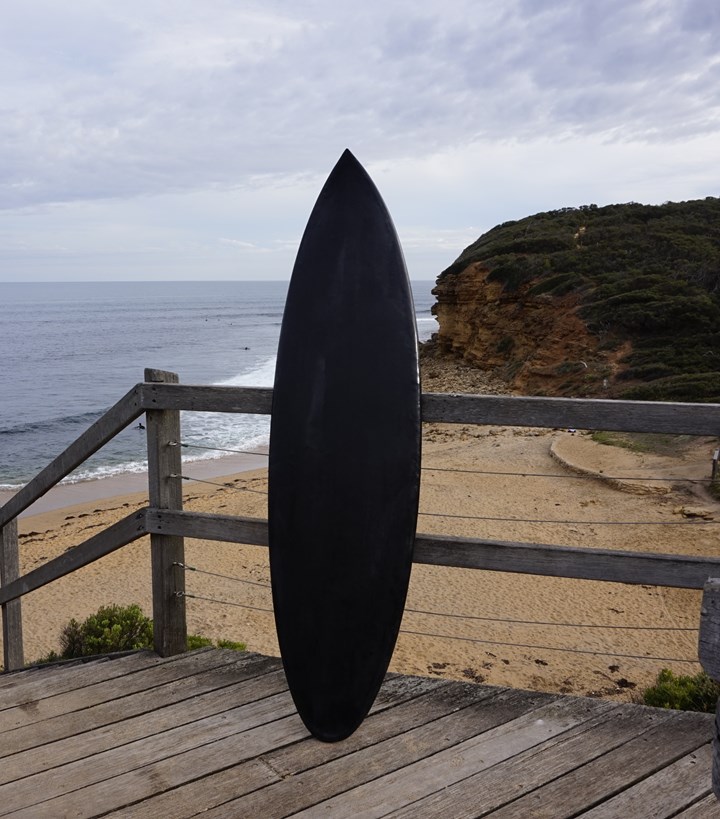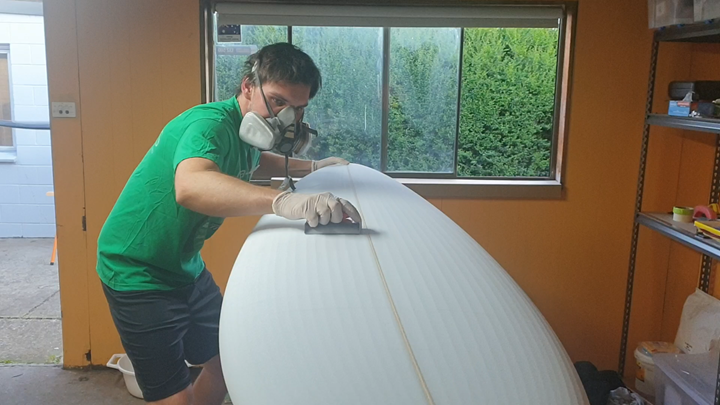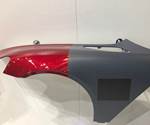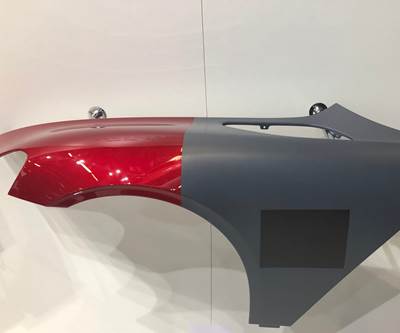
Source | Deakin University
E-glass surfboards have been on the market for decades, with some manufacturers shifting toward more sustainable material options like the bio-based resins used on Cobra International’s ECOBOARDs. Several designs for stronger, lighter carbon fiber surfboards have also been developed. Start-up (Jan Juc, Australia) recently set out to be the first to build carbon fiber surfboards using 100% recycled carbon fiber.
Juc Surf was founded in January 2020 by Dr. Filip Stojcevski, CEO and recent Ph.D. graduate in aerospace engineering from Deakin University (Melbourne, Australia), and current Deakin graduate students Andreas Hendlmeier, lead materials engineer and James Randall, lead chemist, with support from Deakin University’s SPARK Deakin Accelerator program.
According to Hendlmeier, the team began by leveraging its academic experience in working with carbon fiber into production of surfboards built originally from virgin fiber and foam core. They then shifted to adapt their design for recycled carbon fiber after realizing how much carbon fiber waste material from composite manufacturers ends up in landfills. “We saw a chance to change this amount a little bit,” he says, “and it might be an example for different companies to rethink their approach.”
At first, Juc Surf purchased chopped and milled recycled carbon fiber for its boards online from sources selling recycled fiber directly, Stojcevski says. “We were looking for chopped fiber for its aesthetic and reinforcement properties, while we were looking to use the milled [fiber] to give our resin a dark tint and improved fracture toughness.”

For its recycled surfboard line, Juc Surf repurposes scrap carbon fiber materials from local composites manufacturing companies. Source | Juc Surf
Once the company began to build and market its recycled boards, Stojcevski says that local carbon fiber composites manufacturers, such as carbon fiber wheels manufacturer Carbon Revolution (Waurn Ponds, Australia) and carbon fiber bicycle manufacturer LeMond Composites (Geelong, Australia), began to reach out to them to see whether they could use their carbon fiber waste material. Stojcevski says Juc Surf incorporates scrap materials such as bobbin tow ends and scrap fabrics into tail patches, rails and stringers on the surfboards. The team has even, Stojcevski adds, build a homemade loom so that they can, when needed, rework scrap tow ends into a drapable fabric.
“The greatest advantage of the recycled carbon fiber,” Hendlmeier adds, “is that the material properties are still so great that this material still delivers great performance.”
In addition, the team says it has used its chemistry experience to solve composites delamination issues in a new way. According to Randall, delamination “has historically been addressed using etching processes such as electrochemistry or strong acids that serve to roughen the fibers and allow them to mechanically interlock with the resin.” However, he adds, “This is at a sacrifice of fiber strength.”

Each Juc Surf board is handmade by the team. Pictured here, lead materials engineer Andreas Hendlmeier shapes the foam core board before the carbon fiber is applied. Source | Juc Surf
Instead, Juc Surf uses a gentler electrochemistry approach paired with electrolytes to chemically alter the surface of carbon fibers without etching them, Randall says. “In doing so, we have achieved far greater levels of adhesion, which translates to a much more durable and longer-lasting board.”
Currently, Juc Surf manufactures two types of boards: a “pristine” range using virgin automotive-grade Toray (Tokyo, Japan) T300 carbon fiber, and a recycled range, which uses 100% waste and recycled fibers. Stojcevski adds that the company currently uses a traditional epoxy resin, but is working with Gurit (Wattwil, Switzerland) to transition to using a bio-epoxy resin for increased sustainability.
Juc Surf’s recycled surfboards are currently available for pre-order with expectation of first deliveries worldwide as early as November. Beyond surfboards, Stojcevski adds that Juc Surf has plans to expand into other products and services in the future, including sale of its surfboard fabrics, sale of its chemically modified carbon fibers, carbon fiber consultancy work and computation simulation and experimental testing for surfboard designs.
“We also hope to eventually branch out our expertise in carbon fiber materials science into new industries including civil infrastructure and the sporting goods market,” Stojcevski says.
Related Content
Trends fueling the composites recycling movement
Various recycling methods are being considered for composites, from novel dismantling and processing, to building capacity and demonstrating secondary use applications.
Read MoreZEBRA project demonstrates closed-loop wind recycling system
Consortium partners have proven the complete recycling of thermoplastic wind turbines via two manufactured wind blades, featuring reduced operating cost, CO2 emissions.
Read MoreAll-recycled, needle-punched nonwoven CFRP slashes carbon footprint of Formula 2 seat
Dallara and Tenowo collaborate to produce a race-ready Formula 2 seat using recycled carbon fiber, reducing CO2 emissions by 97.5% compared to virgin materials.
Read MorePUR composite sandwich panels for 3D automotive parts, high-volume panels and more
At its U.S. sites, Ascorium produces glass fiber/PUR 3D parts via semi-automated molding, high-volume flat panels via a continuous line while working toward bio-based PUR and recycling.
Read MoreRead Next
The state of recycled carbon fiber
As the need for carbon fiber rises, can recycling fill the gap?
Read MoreScaling up, optimizing the flax fiber composite camper
Greenlander’s Sherpa RV cab, which is largely constructed from flax fiber/bio-epoxy sandwich panels, nears commercial production readiness and next-generation scale-up.
Read MoreNext-gen fan blades: Hybrid twin RTM, printed sensors, laser shock disassembly
MORPHO project demonstrates blade with 20% faster RTM cure cycle, uses AI-based monitoring for improved maintenance/life cycle management and proves laser shock disassembly for recycling.
Read More






.jpg)






